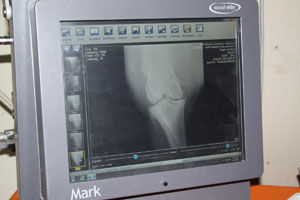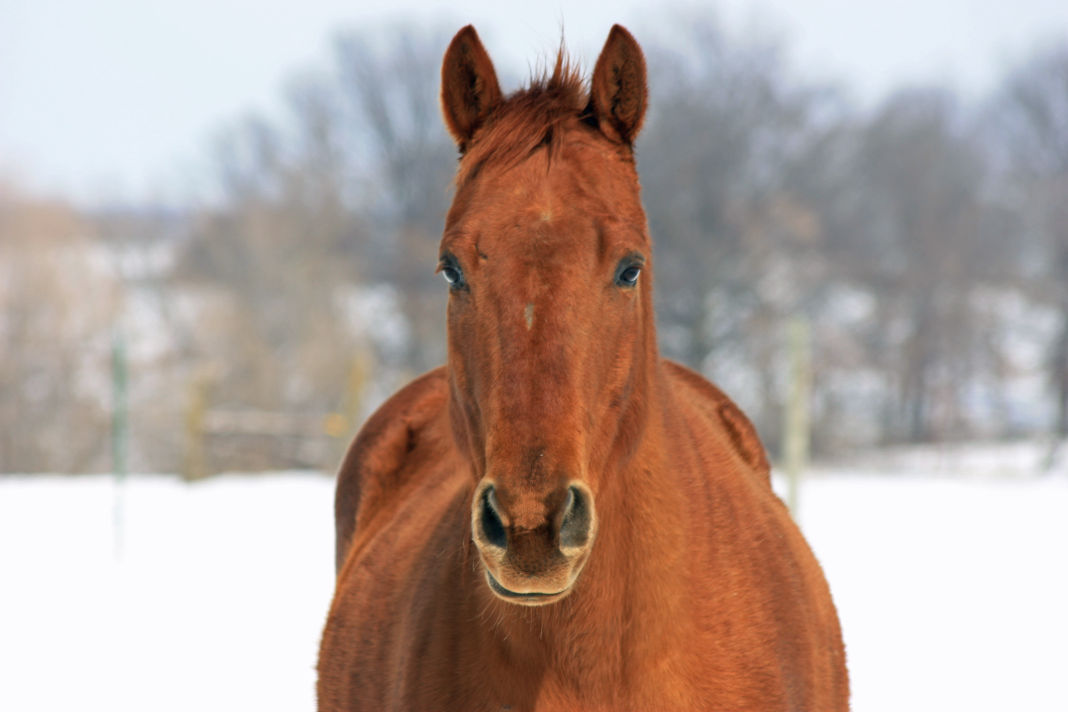For Quinley Koch it wasn’t until after she received her masters degree from Texas A&M University that she realized her desire to become a veterinarian. Koch now owns and operates Elite Equine, a mobile veterinary practice based out of the Wichita, Kan., area.

“I wanted to be a vet when I was younger then decided when I went to college I didn’t want to be a vet anymore,” Koch said. “I went to Texas A&M and got a masters in animal science, equine science and then decided I wanted to be a vet. So I went to vet school after that.”
Koch attended vet school at Oklahoma State University but got her animal science bachelor’s degree at Fort Hays State University in Hays, Kan., where she competed on the rodeo team. She also started a master’s degree at FHSU before going to Texas A&M.
“There was so many things that I learned about (at Texas A&M) that I couldn’t treat anything without being a vet,” she said. “I couldn’t diagnose and treat things, and I had learned so much about exercise physiology and nutrition that I decided I wanted to be able to treat the athletes.”
Following graduation from OSU, Koch completed an internship at Interstate Equine in Goldsby, Okla. There she did “everything a normal vet does.” With the exception of surgeries that require a board certified surgeon, she did emergency work, farm calls, radiographs, standing surgeries, colics, lameness exams, dentals, blood work and wellness exams.
“We were a tertiary referral center, so we had a board certified surgeon and a board certified internist there,” Koch said. “We also worked a lot of the Quarter Horse shows.”
From Goldsby Koch went to Las Cruces, N.M., and worked for a year at a mixed animal practice. Most recently she has started building her client base for her own practice, Elite Equine.
“I wanted to be mobile because I wanted to be able to treat animals on their farms. A lot of owners don’t have the capability of bringing them in or it’s just easier for the owner to go out to their place,” Koch said. “When I was in Oklahoma, I did a lot of mobile work, and I liked the mobile work a lot.”
Being mobile allows Koch to juggle work and home life much easier, in addition to not having to worry about setting up a building to practice out of and the expense involved in that option.
“I like being outside and getting to go places,” Koch said. “Plus it’s more flexible.”
Koch offers a number of things through her practice including: regular preventive care, diagnostics, lameness exams, pre-purchase exams, standing surgeries, chiropractic work on both horses and dogs, dentals, joint injections, etc.
“Lameness exams and chiropractic work is the majority of what I do,” Koch said. “I will work on any horse that needs to be worked on. I do a lot of performance horses, but performance horses are what I like. I like the athlete.”
The bond between rider and horse is what draws Koch to performance horses.
“It amazes me every time I work on them the connection they have with their rider,” she said.
She recently purchased a portable digital x-ray and portable ultrasound machine. The radiograph machine is much like one that is not portable, and can achieve great x-rays.
“It stores all the radiographs in there and also when I download them to my main server at home it stores them in California in a main bank as well,” Koch said. “If we were on the farm and took x-rays and it was a lesion that needed to go to a referral center to have surgery done, I can put your x-rays on a jump drive and send them.”
Currently Koch covers clients in the Wichita, Kan., area and travels to Hays, Kan., once a month to do work for a couple of days.
“I would like to increase my services out here if possible,” Koch said. “I go to events, shows and barrel races. Mostly barrel races right now. I would like to go to more events.”
Sign up for HPJ Insights
Our weekly newsletter delivers the latest news straight to your inbox including breaking news, our exclusive columns and much more.
For clients, Koch’s prices are pretty comparable to those at a regular clinic, with a travel fee added on depending upon distance.
Equine care tips
Koch offered a number of care tips for horse owners. A wellness exam once a year by a veterinarian will catch a lot of things early, she said, maybe helping a lot of problems that can be worse later on.
Vaccinations are very important, she said, most important being Eastern, Western, Venezuelan, West Nile, tetanus and rabies. Those diseases caused by an insect vector are important to protect horses from because owners have little to no control to insect exposure that most often causes the disease.
“If the horse travels off the place, that’s when you think about doing the influenza and rhino vaccinations,” she said.
Dental care is essential even if it’s just a horse that only gets ridden once a year.
“Dental care is really important,” she said. “It affects them for their entire life because their teeth grow for their entire life.”
Horses’ teeth continually grow and if they don’t grind them correctly as they eat, they develop abnormalities and sharp points on their teeth. A float is a file that goes in and basically smooths their teeth so that their teeth function properly and they can attain their nutrition correctly. Koch has a power tool and a manual tool to file the teeth down.
“I typically use the power tool on most horses because it does a better job than I can with the hand floats,” Koch said. “But there’s some cases that you just need to use hand floats.”
Hooves continually grow as well, and require routine care.
“While vets aren’t farriers, we’re the ones that see the horses most often, and need to make sure that the owner is having regular farrier work done on the horse,” Koch said.
More in-depth treatments and therapies help those horses who are used for performance and/or hard work. Chiropractic care for horses has become more prevalent, surprising Koch.
“I still talk to them about it every time that I work on a horse,” she said. “The clients that I work for understand that chiropractic work is not a replacement for vet work. It’s not an alternative, its an integrated medicine that we use on the performance horses to keep them performing at their peak levels.”
Joint injections also help alleviate pain, and are pretty similar to those given to humans. Koch said there are several different types of steroids, and now hyaluronate acid or also called Hyvisc.
“When a performance horse has some kind of pathology such as arthritis, the joint injections can help maintain their comfort and performance level,” Koch said.
Kylene Scott can be reached by phone at 620-227-1804 or by email at [email protected].
